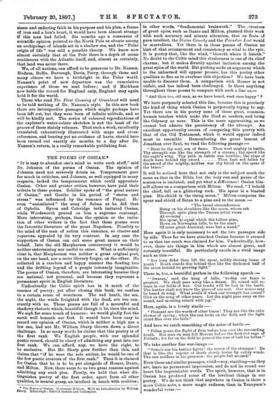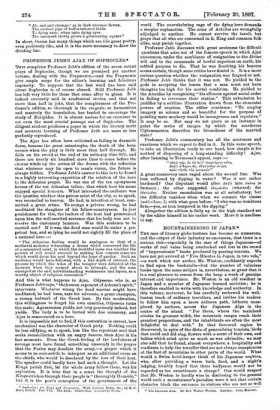THE POEMS OF OSSIA N.*
"IT is easy to abandon one's mind to write such staff," said Dr. Johnson of the poems of Ossiap. The opinion of Johnson need not seriously detain us. Temperament goes for much in criticism, and Johnson, so well equipped in many respects, lacked the temperament which could appreciate Ossian. Other and greater critics, however, have paid their tribute to these poems. Schiller spoke of "the great nature of Ossian," and Goethe in his period of "storm and stress" was influenced by the romance of Fingal. He even " assimilated " the song of Selma as he did that of Ophelia. Byron and Coleridge both imitated Ossian, while Wordsworth poured on him a supreme contempt. More interesting, perhaps, than the opinion or the imita- tion of other writers is the fact that these poems were the favourite literature of the great Napoleon. Possibly to the mind of the man of action this romance, so elusive and vaporous, appealed by its very contrast. In any case the supporters of Ossian can call some great names on their behalf. Into the old Macpherson controversy it would be neither entertaining nor useful to enter. What is sufficiently clear is, that Macpherson was neither a great original poet, on the one hand, nor a mere literary forger, on the other. He collected in a careless and happy manner the floating lore and the drifting legend of a people intensely imaginative. The poems of Ossian, therefore, are interesting because they are national, not personal, and because they represent a permanent spirit in English literature.
Undoubtedly the Celtic spirit has in it much of the essence of poetry; yet after closing this book, we confess to a certain sense of weariness. The sad heath, the sea, the night, the winds freighted with the dead, are too con- stantly with us. These poems are full of a mournful and shadowy rhetoric which, beautiful though it be, tires the mind. We sigh for some touch of humour; we would gladly feel the earth well beneath our feet. It would have been easy to record our opinion of Ossian, which is neither a high nor a low one, had not Mr. William Sharp thrown down a direct challenge. In so many words he claims that this poetry is of the first rank. We English people, with our splendid poetic record, should be chary of admitting any poet into our first rank. We can afford, nay, we have the right, to be exclusive. But Mr. Sharp goes further than this, and claims that "if he were the sole author, he would be one of the few poetic creators of the first rank." Thus it is claimed for Ossian that he is to be put alongside of Homer, Dante, and Milton. Now, there seem to us two great reasons against admitting any such plea. Firstly, we hold that what dis- tinguishes poetry of the first order, apart from all other qualities, is mental grasp, an intellect in touch with realities ;
• The Poems of Ossion. Centenary /Lillian. With an Introduction by William Sharp. Edinburgh: Patrick Geddes and Colleague,.
in other words, "fundamental brainwork." The creators of great epics, such as Dante and Milton, planned their work with such accuracy and minute attention, that as feats of
pure intellect, the Divine Comedy and the Paradise Lost would be marvellous. Yet there is in these poems of Ossian no
hint of that arrangement and consistency so vital to the epic. It is poetry that, like the wind, " bloweth where it listeth."
No doubt to the Celtic mind this elusiveness is one of its chief charms; but it makes directly against inclusion among the great epics of the world. But putting aside an argument which to the unlearned will appear prosaic, has this poetry other qualities so fine as to overbear this objection ? We have been unable to discover them. A comparison with Homer is not unfair, and has indeed been challenged. Is there anything throughout these poems to compare with such a line as,—
" And thou too, old man, as we have heard, wast once happy" ?
We have purposely selected this line, because this is precisely the kind of thing which Ossian is perpetually trying to say.
Yet there are in his poetry none of those great, common, human touches which make the Iliad so modern, and bring the Odyssey so near. This is the more aggravating, as we cannot but admire the persistency of the attempt. An excellent opportunity occurs of comparing this poetry with that of the Old Testament, which it would appear indeed most to resemble. Remembering the great lament of Jonathan over Saul, we read the following passage :—
"Blest be thy soul, son of Semo. Thou wort mighty in battle. Thy strength was like the strength of a stream ; thy speed like the eagle's wing. Thy path in battle was terrible ; the steps of
death were behind thy sword Thou hast not fallen by the sword of the mighty, neither was thy blood on the spear of the brave."
It will be noticed here that not only is the subject much the same as that in the Bible, but the very run and pause of the sentences is imitated; and yet what a difference ! Ossian him-
self allows us a comparison with Milton. We read, "I beheld the chief, tall as a glittering rock. His spear is a blasted pine. His shield is the rising moon." Milton compares the spear and shield of Satan to a pine and to the moon :—
" The broad circumference
Hung on his shoulders like the moon, whose orb Through optic glass the Tuscan artist views At evening His spear, to equal which the tallest pine, Hewn on Norwegian hills, to be the mast Of some great Ammiral, were but a wand."
Here again it is only necessary to set the two passages side by side. Thus far we have attacked Ossian because it seemed to us that too much was claimed for him. Undoubtedly, how- ever, there are things in him which are almost great, and certainly beautiful He particularly excels in a vivid image such as this :—
" Nor long didst thou lift the spear, mildly shining beam of youth ! Death stands dim behind thee like the darkened half of the moon behind its growing light."
There is, too, a beautiful pathos in the following speech :— " Swaran: said the king of hills, to-day our fame is- greatest. We shall pass away like a dream. No sound will re- main in our fields of war. Our tombs will be lost in the heath. The hunter shall not know the place of our rest. Our names may be heard in song. What avails it when our strength has ceased ? Give us the song of other years. Let the night pass away on the sound, and morning return with joy."
Here, again, is a lovely simile :— " Pleasant are the words of other times ! They are like the calm shower of spring ; when the sun looks on the field, and the light cloud flies over the hills."
And here we catch something of the noise of battle :— " Fillan pours the flight of Erin before him over the resounding heath. But man on man fell 3forvan before the dark-red rage of Foldath; for far on the field he poured the roar of half his tribes."
We take another fine war-image :— " Semo's son his battles fights ! the terror of the stranger ! He that is like the vapour of death slowly borne by sultry winds. The sun reddens in his presence : the people fall around."
Even these and similar passages, vivid—nay, startling—as they are, leave no permanent impression, and do not lie round our heart like imperishable words. The spirit, however, that is in Ossian has produced some of the loveliest things in our poetry. We do not think that anywhere in Ossian is there a more Celtic note, a more magic sadness, than in Tennyson's wonderful verse :—
" Ah, sad and strange ! as in dark summer dawns, The earliest pipe of half-awakened birds To dying ears; when unto dying eyes The casement slowly grows a glimmering square."
In short, Ossian has many things which are like great poetry, even perilously like, and it is the more necessary to draw the dividing line.



































 Previous page
Previous page